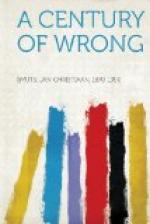Johannesburg, and that in all probability a disturbance
of the peace would take place if a sufficient body
of the police were not present to preserve order.
To this these gentlemen answered that the police were
in very bad odour since the Edgar case, that the meeting
would be a very quiet one, and that the presence of
the police would contribute, or give rise to, disorder,
and that they would on those grounds rather have no
police at all. The State Secretary and State
Attorney thereupon communicated with the head officials
of the police at Johannesburg, with the result that
the latter also thought that it would be better not
to have any considerable number of police at the meeting.
The Government accordingly, on the advice of these
officials of the League as well as their own police
officials, gave instructions that the police should
remain away from the meeting; they did this in perfect
good faith, and with the object of letting the League
have its say without let or hindrance. The proposed
meeting was however advertised far and wide. As
the feeling amongst a section of the Witwatersrand
population was exceedingly bitter against the League,
a considerable number of the opponents of that body
also attended the meeting. The few police who
were present were powerless to quell the disorder,
and when the police came on the scene in force some
few minutes after the commencement of the uproar,
the meeting was already broken up. Taken by itself,
this occurrence would not be of much importance, as
it is an isolated instance as far as the gold fields
of this Republic are concerned, and even in the best
organised and best ordered communities irregularities
like the above occasionally take place.
The gravity of the matter, however, lies in the unjust
accusation of Her Majesty’s Government—that
the meeting was broken up by officials of this Republic,
and that the Government had curtly refused to institute
an enquiry.
This Government would not have refused to investigate
the matter if any complaints had been lodged with
it, or at any of the local Courts, and this has been
clearly stated in its reply to Her Majesty’s
request for an investigation.
The Government objects strongly to the systematic
way in which the local authorities are ignored, and
the continual complaints which are lodged with the
Representatives of Her Majesty about matters which
ought to be decided by the Courts of this Republic.
Instead, however, of complaining to Her Majesty’s
Government after all other reasonable means of redress
have been vainly invoked, they continually make themselves
guilty of ignoring and treating with contempt the
local Courts and authorities, by continually making
all sorts of ridiculous and ex parte complaints
to Her Majesty’s Government in the first instance;
Her Majesty’s Government is also thereby placed
in the equivocal and undesirable position of intermeddling
in the internal affairs of this Republic, which is




